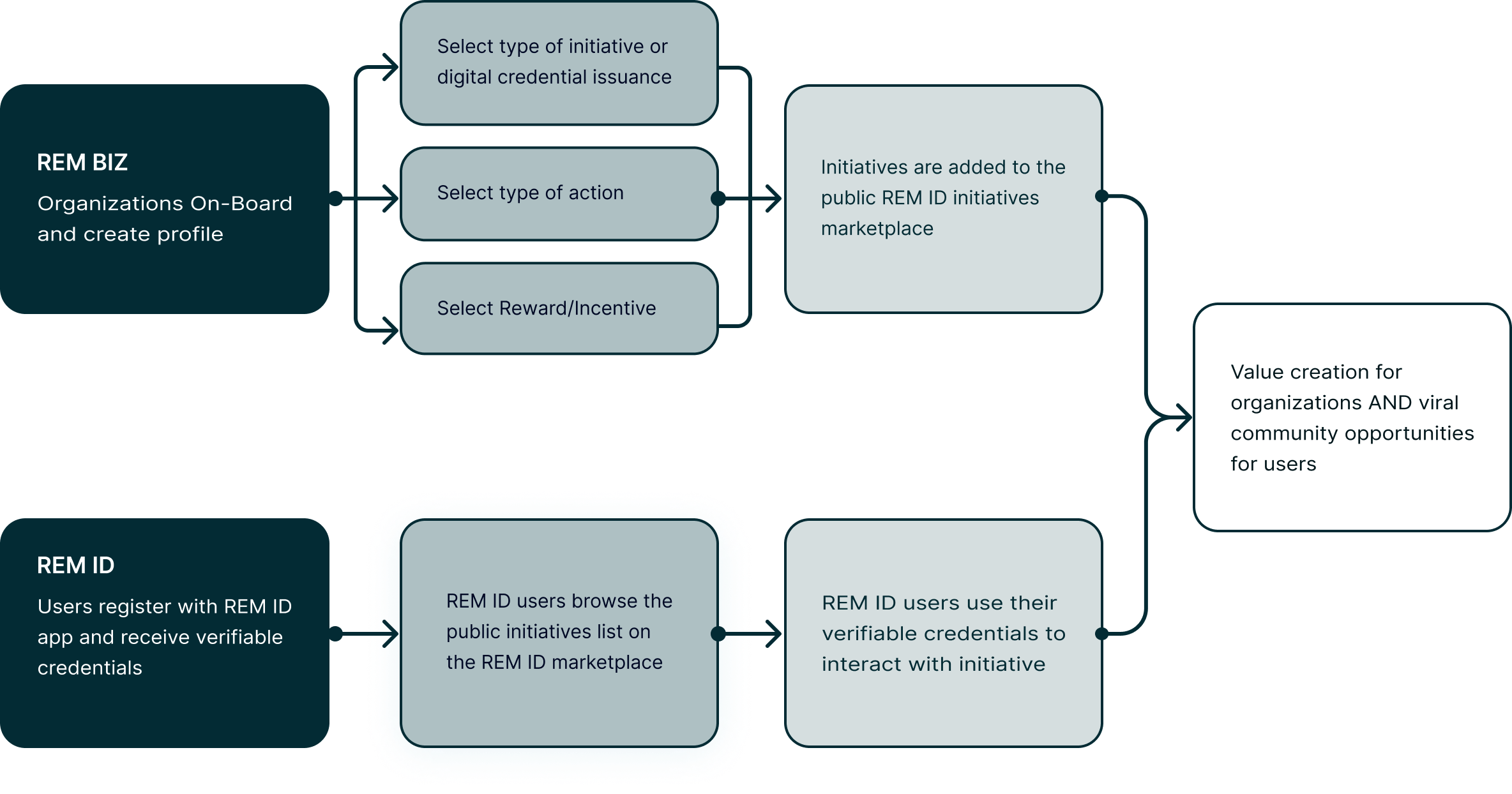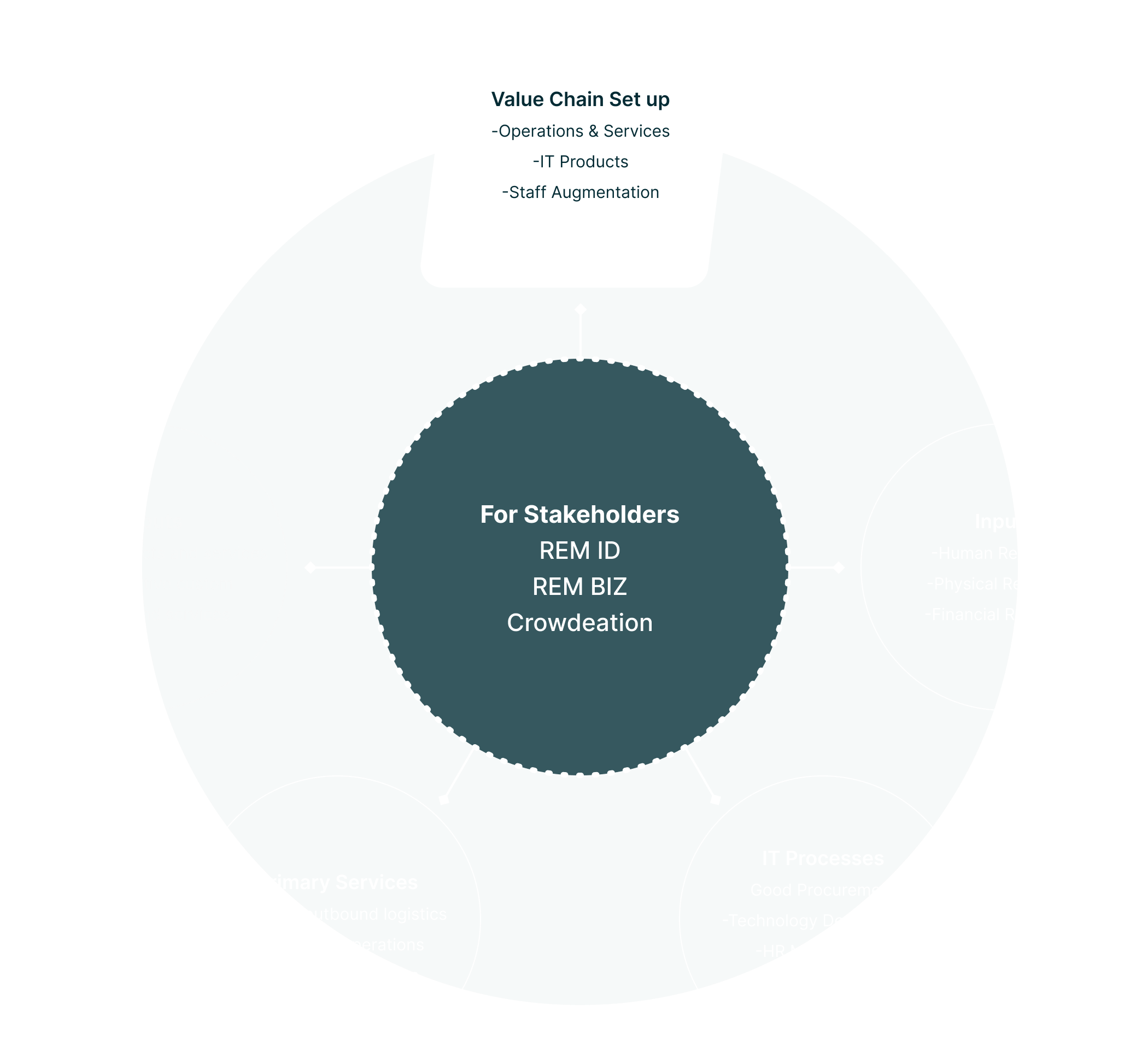Lead or Join an Ecosystem
WDI has created SaaS platforms that leverage AI and blockchain for organizations to participate in or create digital ecosystems (value chains).
Academic
Empower students around the world with digital credentials and new opportunities
Financial
Participate in emerging trust based products by adopting our white label digital payment wallet.
Associations
Enhance your associations reach by issuing and offering your members digital credentials
We work together
WDI supports your organization by collaborating with a myriad of industry leading global partners
Build your Web 3.0 Value Chain foundation with the following products...
How Our REM Platform Works
Rem
Lets organizations expand their services into new virtual communities using innovative initiatives.
How can organizations create new innovation initiatives?

How our collaborative innovation platform works
Crowdeation
Crowdeation is WDI’s fully decentralized innovation platform, functioning as a hub for new ideas, shareable projects, and opportunities for crowdsourcing.
Create and share new ideas, challenges, or solutions and connect with other users for feedback, collaboration, and funding. Search and filter through hundreds of existing ideas or challenges you can participate in.
Managed Services
The traditional value chain model describes business as a series of interlinked processes that add value to a product or service.
Community value chain model
We use blockchain technology to enhance this model, creating a “Community Value Chain”, where key processes within the value chain are decentralized, creating traceability for all the value chain stakeholders.

Our Core Team
World Data Inc provides clients with WEB 3.0 platforms and consulting services to help transform their businesses to make the most of WEB 3.0’s potential.
WDI has been in operation over 30 years, providing IT and consulting services in the U.S and emerging global markets. Our team has extensive experience in all IT and network disciplines, including mobility, cloud computing, and data analytics. We are C-Level executives in operating service companies.

Oscar Bazoberry
CEO
oscar@worlddata.com
202-669-8996

Sergio Bazoberry
CCO
sergio@worlddata.com
202-903-0409

Jaime Centellas
CTO
jcentellas@worlddata.com

Felipe Da Silva
PM
felipe.da.silva@worlddata.com

Hisham Alqasrawi
IT-VP Networks
hisham@worlddata.com

Luciana Cordova
Dir Strategic HR
lucianac@worlddata.com

Magdalena Ponce de Leon
UI/UX Consultant
pdeleon@worlddata.com

Oscar Bazoberry
202-669-8996

Sergio Bazoberry
202-903-0409

Jaime Centellas

Felipe Da Silva

Hisham Alqasrawi

Luciana Cordova

Magdalena Ponce de Leon

Paola Uzquiano
FAQ
Here are some of the most frequently asked questions about our products at WDI
“Digital Credentials” is used as an umbrella term for any sort of credential, whether it’s a diploma, vaccine card, insurance card, course certificates etc., that can be digitally issued to an individual.
Verifiable digital credentials are sub-genre of digital credentials. As stated in the name, these are DC’s that the receiving party can validate or verify as authentic. In our case, we issue our DC’s using a blockchain network, allowing users to instantly verify them with 100% certainty that they are authentic.
Our platform allows anyone to use, receive, and issue their own credentials. This ranges from verified organizations and institutions who might issue credentials such as diplomas or employee identification cards, but it also includes personal individual credentials that contain information such as passwords, credit card, and digital keys.
Verifiable digital credentials are still relatively new, but the ecosystem that supports them is growing exponentially. Currently, the most common use cases for VDC’s include academic achievements, job applications, employee identification, training certificates, KYC and due diligence processes, and supply–chain management. More and more industries are starting to adapt to this technology, so you can expect to see new use cases emerging right and left.
Self-Sovereign Identity (SSI) refers to a model in which users have sole ownership and control over their personal data. In the case of our VDC, this means that all the data and information stored inside the VDC’s belong exclusively to its owner. We take user data very seriously and follow all the latest global standards to store and encrypt user data in our blockchain network. Unless given specific permissions, nobody besides the user can access it.
We are currently living in an age where personal digital information is highly sought after by third party intermediaries. Providing the means for users to safely use and store VDC’s with sensitive personal information is very important. By using an SSI model, users can feel safe knowing that they are fully protected from data-miners, or even malicious attacks from hackers and phishers.
There are many benefits to REM ID compared to other traditional DC platforms such as Credly and Accredible. First, we have built our REM apps using LACChain, a public ERC20 based blockchain network we helped found and create, ensuring both safety and speed throughout all the processes behind issuing, receiving, and verifying a VDC.
Second, thanks to our SSI model, users are the ones who control, own, and have the rights to their credentials. Much like a physical possession, our VDC belongs to the users, not us.
Third and most importantly, we have built a module called “Initiatives” inside our wallet. These initiatives can be configured in our REM backend platform by institutions, organizations, or groups, to provide a space where users can use their credentials in a way that provides value for both parties. For example, a verified academic institution can configure an Initiative for a scholarship, where users that received a certain credential can apply.
Currently, one of the biggest challenges facing the digital credential industry is a lack of value or incentive for users to adopt and start using VDCs. Our Initiatives module eliminates this problem.
There is no limit or specification to the types of initiatives you can create. We work with verified institutions, organizations, and groups to create a myriad of initiatives that can bring value to the users and issuers. For example, a company that needs to survey all their employees can create a surveying initiative that rewards participants with gift cards.
The sky is the limit for what you can built. An example of past successful initiative was during the COVID19 pandemic. We worked with several health departments to issue digital vaccine cards which could then be used to collect symptom and location data from willing participants. This data was then used to create a public heat map of recent cases and outbreaks for contact tracing across Latin America.
Web3 can be defined as an internet where the users have control over their data and digital identity without relying on centralized intermediaries. In the future, as the internet and its services become more decentralized, users will need a way to safely interact with these services. Our hope is that our suite of decentralized applications will provide an early steppingstone for users to start adapting and taking advantage of the emerging technologies and opportunities that Web3 presents.
The WalletOn Banking application is a mobile and web-based software platform that allows Financial Institution customers to access their bank accounts and perform various financial transactions such as checking account balances, transferring money, making credit payments, and social security payments.
To download the WalletOn Banking app, you can go to the App Store or Google Play Store on your mobile device and search for the name of your Financial Institution or Cooperative. Once you find your Cooperative‘s app, simply click on the download button to install it on your device.
The WalletOn Banking (Software provided by WDI) app uses a variety of security measures to protect your personal and financial information, such as two-factor authentication, and encryption. However, it’s important to make sure you have a strong password and don’t share your login credentials with anyone.
Yes, you can access your bank account information such as account balances, transaction history, and account statements through the WalletOn Banking app. It is important to know that WalletOn is branded by many financial institutions. WDI is only the software provider.
Yes, you can transfer money between your own accounts or to other accounts at the Financial Institution using the WalletOn Banking app. However, you will need to have the necessary funds available in your account and the recipient’s account information to complete the transaction.
Please contact your Financial Institutions customer team for assistance.
Yes, the WalletOn Banking app software allows you to lock or unlock your debit card when you see it convenient (e.g. card stolen, card not used,,). Look for the cards section in the app.
WDI is not a Financial Institution, WDI is a Software Development Enterprise.
Any organization can register and set up on Crowdeation.
Crowdeation serves as a hub for new challenges and ideas. The philosophy behind Crowdeation is to encourage innovation, collaboration, and communication throughout all divisions of a company. One of our goals is to help eliminate communication silos that often form across different departments and hinder new ideas and solutions from being heard.
Crowdeation lets anybody come up with a new pilot, idea, or challenge. There is no limit to what can be created and will often vary from company to company. A hypothetical example might be that a company needs ideas to help streamline their data management. They can post a challenge publicly and allow employees to post and discuss potential solutions within that challenge. Another example might be that an employee thinks of an interesting new pilot idea. They can post it and instantly receive feedback and recognition for it.
Organizations are constantly looking for new ways to innovate, optimize, or improve their current operations. The problem is that often, some of the best ideas or solutions come from an individual or department without much say in the matter. Crowdeation eliminates these communication silos by providing a space where everyone within the company can collaborate and have their idea or solution be seen and recognized.
Users that provide the best ideas or solutions can be rewarded within the company. Additionally, it creates an equitable environment for all employees based on the quality of their contribution. Users can see exactly who came up with each idea or solution, and therefore receive the credit and recognition they deserve for it.
Decentralized means that there is no single centralized server or authority that the system depends on. This means that the platform can be more transparent and secure, ensuring that participants are fairly credited with any contribution they might have.
Crowdeation will not be free for organizations that wish to implement it, however there will be no fees for the end users.
Contact Us
We’re here to help!
© 2025 | World Data Inc. All Rights Reserved.


